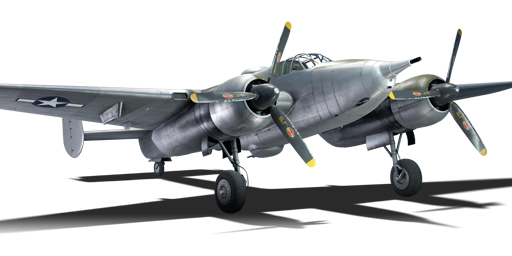



In 1942, the U.S. Army was looking for a suitable aircraft to replace the Douglas A-20 Havoc. Beech Aircraft Corporation would be given a contract to build two Model 28 "Destroyer" prototypes. Later given the designation XA-38 "Grizzly", it was originally intended to be a bomber hunter until the Army wanted a capable ground-attack aircraft. To attack well-armoured targets like bunkers and tanks, the Grizzly was fitted with a 75 mm cannon mounted directly into the nose. The Grizzly was also given two twin .50 cal turrets, one mounted on the top and one mounted in the belly to provide defensive fire. Although the Grizzly was favourable in test flights, it unfortunately fizzled out as the Wright R-3350 engines were needed for the B-29 program.
The XA-38 was introduced in Update 1.71 "New E.R.A." as a premium strike aircraft. It is a strong aircraft against ground targets thanks to its 75 mm cannon and bombs. The 75 mm cannon is able to penetrate up to 104 mm of armour which is more than enough to penetrate the sides and engine decks of many ground vehicles. Although the Grizzly has turrets, it's an easy target for enemy fighters; especially when the rear crewman is knocked out. The XA-38 Grizzly is an interesting plane that can be incredibly dangerous in ground battles.
flaps
flaps
flaps
brake
| Belt | Belt filling | Armor penetration (mm) at a distance: | |||||
|---|---|---|---|---|---|---|---|
| 10 m | 100 m | 500 m | 1000 m | 1500 m | 2000 m | ||
| AP-T/HEI-T | 104 | 102 | 93 | 84 | 75 | 68 | |
| AP-T | 104 | 102 | 93 | 84 | 75 | 68 | |
| HEI-T | 10 | 10 | 10 | 10 | 10 | 10 | |
| Belt | Belt filling | Armor penetration (mm) at a distance: | |||||
|---|---|---|---|---|---|---|---|
| 10 m | 100 m | 500 m | 1000 m | 1500 m | 2000 m | ||
| T/Ball/Ball/I/AP-I | 28 | 26 | 18 | 11 | 7 | 4 | |
| AP-I/AP-I/AP-I/T/I | 28 | 26 | 18 | 11 | 7 | 4 | |
| T/AP/AP/AP/AP-I/I | 30 | 27 | 20 | 13 | 9 | 6 | |
| T/T/T/T/T/AP-I | 28 | 26 | 18 | 11 | 7 | 4 | |
| AP/AP-I/AP-I/I/I | 30 | 27 | 20 | 13 | 9 | 6 | |
| Belt | Belt filling | Armor penetration (mm) at a distance: | |||||
|---|---|---|---|---|---|---|---|
| 10 m | 100 m | 500 m | 1000 m | 1500 m | 2000 m | ||
| T/AP/I/AP-I | 30 | 27 | 20 | 13 | 9 | 6 | |
| AP/AP/AP/T | 30 | 27 | 20 | 13 | 9 | 6 | |
| AP-I/AP-I/AP-I/T | 28 | 26 | 18 | 11 | 7 | 4 | |







 2 x (90 / 165 / 490) %
2 x (90 / 165 / 490) % 
 2 x 160 %
2 x 160 % 

Flight performance | |
|---|---|
Survivability |
|---|
Weaponry | ||
|---|---|---|